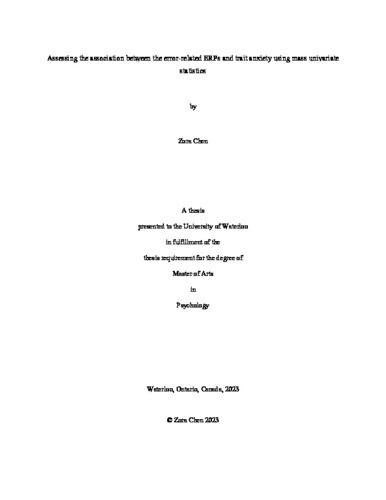| dc.contributor.author | Chen, Zelin | |
| dc.date.accessioned | 2023-09-28 18:57:57 (GMT) | |
| dc.date.available | 2024-01-27 05:50:08 (GMT) | |
| dc.date.issued | 2023-09-28 | |
| dc.date.submitted | 2023-09-22 | |
| dc.identifier.uri | http://hdl.handle.net/10012/19979 | |
| dc.description.abstract | Enhanced error monitoring, as reflected in increased amplitude of the error-related negativity (ERN) ERP component, has been suggested to be a vulnerability neuro-marker of anxiety disorders. However, the association between an enhanced ERN amplitude and increased anxiety levels in the nonclinical population have been inconsistent. In a sample of 82 adults, we examined the association between anxiety and the ERN with different analytical methods (mass-univariate statistics and conventional analyses), self-reported anxiety scales (STAI and STICSA), and trial numbers (all correct trials and equal numbers of correct and error trials). Both the conventional and mass-univariate analyses demonstrated a robust enhancement of the ERN and Pe relative to the correct-ERPs. However, the mass-univariate approach additionally unveiled a wider array of electrodes and a longer duration of involvement in this error enhancement. There was no consistent moderation of the findings by trial numbers, analyses, and anxiety scales. Across the analytic methods, the results showed a lack of consistent correlation between trait anxiety and error-related ERPs. The present results suggest a lack of enhancement of error monitoring by anxious traits in individuals with sub- clinical anxiety and those with clinical anxiety but without a clinical diagnosis. Importantly, the absence of such correlation questions the validity of the ERN as a neural marker for anxiety disorders. Future studies that investigate neuro-markers of anxiety may explore alternative neural signatures and task designs and employ robust statistics to provide a more comprehensive understanding of anxiety vulnerability. | en |
| dc.language.iso | en | en |
| dc.publisher | University of Waterloo | en |
| dc.title | Assessing the association between the error-related ERPs and trait anxiety using mass univariate statistics | en |
| dc.type | Master Thesis | en |
| dc.pending | false | |
| uws-etd.degree.department | Psychology | en |
| uws-etd.degree.discipline | Psychology | en |
| uws-etd.degree.grantor | University of Waterloo | en |
| uws-etd.degree | Master of Arts | en |
| uws-etd.embargo.terms | 4 months | en |
| uws.contributor.advisor | Itier, Roxane | |
| uws.contributor.affiliation1 | Faculty of Arts | en |
| uws.published.city | Waterloo | en |
| uws.published.country | Canada | en |
| uws.published.province | Ontario | en |
| uws.typeOfResource | Text | en |
| uws.peerReviewStatus | Unreviewed | en |
| uws.scholarLevel | Graduate | en |

